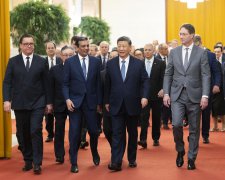Home>>
How Xi's crackdown on excess reshapes China(Xinhua) 09:27, March 29, 2025
BEIJING, March 28 (Xinhua) -- The Communist Party of China (CPC) has launched a four-month campaign to urge its around 100 million members to bolster compliance with a code of conduct that has strengthened the Party over the past 12 years.
This education campaign on the eight-point rules was planned by none other than China's top leader Xi Jinping. During his inspection tour to southwest China last week, Xi urged Party organs at all levels to meticulously organize and implement the campaign.
He called for fighting misconduct and corruption as a whole, and making relentless efforts to root out the underlying conditions for corruption.
Exercising full and rigorous Party self-governance has been a signature and cornerstone of Xi's leadership. In his first press appearance as the newly elected general secretary of the CPC Central Committee in November 2012, he candidly acknowledged that the Party faced "numerous severe challenges," with corruption being a primary concern.
He immediately started addressing the issue by tackling the deteriorating conduct of officials -- some had indulged in extravagance, grown content with empty formalities, or put on an air of bureaucracy.
"The Party's conduct is crucial to winning the people's support and is a matter concerning the Party's survival or demise," Xi said.
In less than 20 days, the eight-point rules were introduced by the CPC central leadership. Spelled out in just over 600 words, the eight-point rules established regulations for Party leaders regarding research tours, meetings, documentation, and other official duties, cracking down on lavish banquets, red carpet events, pomp, entourages, unnecessary meetings, and luxury perks that had once been regarded by some as typical symbols of power.
According to the eight-point rules, when conducting grassroots field studies, officials should learn from the people on the ground. Ceremonial formalities such as banners and floral arrangements are not allowed. Official meetings and events must be streamlined. Security protocols such as traffic controls and road or venue closures should be minimized.
The code of conduct started off with a bang, yielding immediate and remarkable results.
"Few anticipated that the persistent issues of official extravagance plaguing China's political circles would undergo such a striking transformation," Singapore's Lianhe Zaobao newspaper observed.
Over the past decade, the eight-point rules have kept evolving and today remain a defining hallmark of Xi and the CPC's efforts to ensure good and clean governance.
A LONG-HELD TRADITION
Son of revolutionary leader Xi Zhongxun, Xi Jinping learned from his father's rigorous and disciplined approach to life and work from a young age.
Four children of the family studied at a boarding school, and every weekend, they took the bus home. The elder Xi had never picked them up with his official car.
He taught his children to live frugally and always maintain a humble and modest attitude.
Over the years, a frugal lifestyle, strict self-discipline, and strong ties with the masses remained with Xi Jinping.
In the late 1980s, when he served as the Party chief of Ningde, a poor prefecture in Fujian Province, Xi Jinping refused to take a new imported car as his vehicle for official use, and insisted on using an old one left by his predecessor.
"We are in a poverty-stricken area, and we should not flaunt wealth or indulge in extravagance," Xi told his staff.
As he once explained, issues of official misconduct often stemmed from the improper handling of private and public interests, along with the abuse of power.
In 1989, Ningde introduced a set of 12 rules promoting clean governance and self-discipline among officials. These straightforward guidelines prohibited misconduct such as excessive wining and dining during inspection tours and the use of official vehicles for personal purposes.
"The power of us Communists, regardless of its extent, is granted by the people and is mandated solely to work for their benefit," Xi said.
In the early 2000s, after Xi was appointed as Zhejiang's provincial Party chief, Sun Guangming served on his staff, overseeing the planning of Xi's inspections.
He recalled that during these inspections, Xi consistently demanded corrections whenever local officials arranged lavish receptions featuring expensive dishes, fine liquor, or gifts of local specialties.
Sun said that based on Xi's instructions, the general office of the provincial Party committee imposed strict standards for official receptions, giving a heads-up along with Xi's itinerary to local authorities before each inspection tour. These requirements, typically consisting of seven or eight points, resembled the eight-point rules now in effect.
Sun believes the rules, adopted at the Political Bureau meeting chaired by Xi on Dec. 4, 2012, signify that Xi has ushered in a new era of the Party's full and rigorous self-governance.
LEADING BY EXAMPLE
When the eight-point rules were established, some questioned whether the campaign was merely a passing fad or a political show. Xi knew enforcement was crucial.
"Promises made must be kept. In the Political Bureau, it (enforcement) starts with me," he said.
Three days after the rules were issued, Xi visited Guangdong Province. He declined the option of staying in a presidential suite, choosing instead to stay in a standard suite at a hotel.
"He told us not to upgrade anything in the room -- no new purchases, no extra additions," recalled a manager of the hotel, surnamed Qu.











